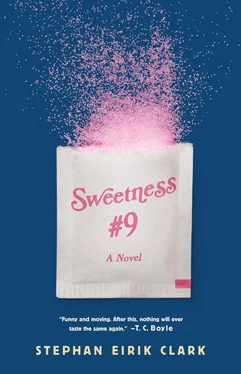And my rats could be the same. Had they been able to speak, they might have told me there was more to food safety than looking for tumors and cancers and misshapen organs — all the stuff of the Delaney Clause. Perhaps they felt shooting pains in their sides or suffered from numbness in the extremities. They could have unexplained cramping, or feelings of vertigo or tinnitus. There was blurred vision to consider, fuzzy memory, slurred speech; joints that creak while you walk, shortened attention spans, bouts of panic. Perhaps they were seeing an atomic whirl at the periphery of their vision, perhaps only at certain times of day or night. There were so many things we didn’t or couldn’t test for: mood changes, phobias, difficulty swallowing; too much thirst and hunger, too little. They could be feeling godlike and unreal, confused and lost in a fog, unable to think straight — or worse.
“I think Louie might be suicidal,” I said.
“Oh dear god.” Hickey stood and turned toward a row of bushes that ran away from his tool-shed. “You’re obviously drunk.”
“What?” I went to follow him, realizing too late, as he was unzipping his shorts and then dipping his one good knee to pull himself out, that he was urinating. “He sleeps with his face pushed down into the sawdust. He’ll suffocate. But what’s worse is, I don’t think he even cares.”
“You’re serious?” He shook, then turned round, listing to one side as he zipped himself up. I looked two doors down, where a neighbor lady was collecting her wash from the laundry line. “You’ve had him on the couch then, have you?”
“Listen, I know we can’t give him the Minnesota Multiphasic.”
“Because do you really want to go to the fourth floor with this?”
“The fifth.”
“‘Leveraux’s mouse is depressed, fellas.’”
“My rat.”
“‘Better pull the plug.’”
“I’ve been working with him for weeks. I know.”
“‘Forget the millions you’ve pumped into R&D.’”
“He just lies there!”
“‘The rat can’t get out of bed!’”
“Some days he doesn’t even eat, Hickey!”
“Well, good! It is a no-calorie sugar substitute, remember! Someone’s gotta lose weight!”
As he brushed past me back toward the table, I remembered the fat face I’d seen in the window of the door to the primate room, when Hickey had been in there burping one of his monkeys. But he wouldn’t say anything more. After finishing the last of his beer, he saluted his POW*MIA flag and started indoors, saying he was calling it a night.
After the screen door had slammed shut behind him, I started toward my car with as much purpose as I had lacked on my walk in from it earlier. Betty was at her mother’s; there was no reason to rush home. So I drove back out toward the ocean, parked after waving hello to the night guard at the gate, then walked into the lab and went straight to the door beneath the red-on-white sign marked PRIMATES. Hickey had rolled a TV in there during the week, and as I pulled at the door, I could hear two men speaking in cartoonish German accents.
I found each monkey pushed back into the darkened corner of his cage. They all looked alike. They sat with a bottle of sweetened milk in one hand, surrounded by a scattering of banana peels. Their eyes were fixed on the TV in front of them, and whenever I passed before it or blocked the screen, they leaned to one side or the other, trying to maintain their line of sight.
A narrow gutter cut across the concrete floor in front of the cages, ending at a drain. A gutted cardboard box lay next to it with an empty bladder of milk spilling out from inside. The monkeys had kept Hickey busy. He’d been running back and forth between them and the tap, silencing their cries with another round of sweetened milk and a bunch of bananas, until only their silent appetites remained.
I looked over my shoulder to the television. Jerry Lewis sat in the backseat of an open-roofed Mercedes-Benz, dressed like a Nazi general, as he argued with a soldier at a checkpoint. I recognized the scene from when I’d seen it in the theaters. Which Way to the Front? I turned off the television, but the screaming of the monkeys — I can hear it even now — sent me scrambling to flip it back on.
As my breathing returned to normal, I found the courage to look, to really look at the monkey directly in front of me. It was akin to staring at a total lunar eclipse; it filled me with such dread and awe. You see, after almost four months of The Nine and all the bananas he could take, this monkey was pot-bellied and thick-limbed, sitting there with an oddly swollen face. His breathing slowed, became shallow. He looked through me, lost in an unblinking daze.
I fell down out of my crouch and felt the cool of the concrete floor rush up to meet me.
These monkeys; they were no different from four out of every ten Americans today.
They were not simply overweight. They were obese.
HICKEY WAS ALREADY THERE WHEN I came in to work the next morning, but we didn’t talk as I gathered my things at my desk and then crossed into the rodent room. Our first words were exchanged near lunchtime, after he had emerged from the primate room holding a diapered monkey and feeding it from a bottle. I wouldn’t have been more surprised if he’d reemerged cradling a baby in his arms.
“Where’d you get that one?” I said.
The monkey was thin, disturbingly so — anorexic compared to the ones I’d seen the night before.
Hickey sat at his desk, with his back turned to me.
“Did they expand your test group?” I asked. “Deliver him this morning?”
He spoke over his shoulder. “You stopped in here last night?”
“I left a few things behind. Now, c’mon, tell me. Where’d you get him?”
He didn’t answer. Just turned away from me. So I strode out the door, telling him he wasn’t the only one I could ask, and took the elevator up to the fifth floor, where I was met by a smiling secretary.
“John Rogers, please,” I said. And when she just looked at me blankly, I held my hand out even with my shoulder as if to remind her of his height. “Maybe I mean Roger Johns? It’s important,” I added.
A man stepped into the doorway of the office behind her and fixed me with an appraising look. “You mean Billy?”
Now it was my turn to look confused. “Billy?”
He chuckled and explained it was an old prep school name. “You won’t find him around here anymore, though. He’s joined the other side.”
Thinking this might be a corporate euphemism for death, I affected a look that was suitably mournful and, when invited, followed him into his office at a slow, funereal pace.
“I’m sorry to hear about Billy,” I said. “I didn’t know him very well, but he seemed like such a good fellow.”
He showed me to a chair before his desk, saying I shouldn’t feel too sorry for him. “Nothing beats government work, eh? Or is it the other way around? ‘It sure beats government work?’” He waved it off, saying that probably explained why he’d agreed to come here. “I didn’t know the answer, did I?”
I smiled, but even so he saw the need to elaborate.
“He’s joined the FDA,” he said. “Which I just left.”
“Billy?”
“Likes to joke he got traded for a player to be named later and an undisclosed amount of cash. Well”—he turned his palms to the ceiling—“here am I. Just don’t go asking about that money.”
He laughed loudly. I showed a jagged mouthful of teeth, trying unsuccessfully to do the same.
“Candy?” He sat up from his seat and extended a dish of cut crystal. I reached for a butterscotch. He was chewing his before I could even get mine unwrapped.
Читать дальше












